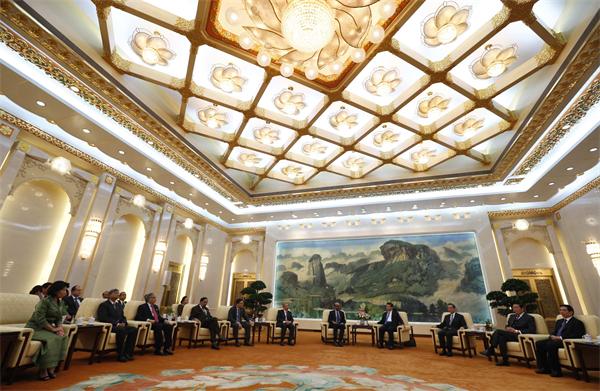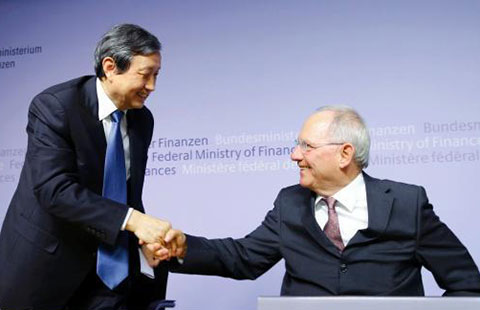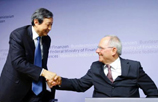Global finance a game of the more the merrier
By Hua Xiuping (China Daily) Updated: 2015-03-26 08:22
 |
|
China's President Xi Jinping (4th R) meets with the guests at the Asian Infrastructure Investment Bank (AIIB) launch ceremony at the Great Hall of the People in Beijing in this October 24, 2014 file photograph. [Photo/Agencies] |
China's decision to establish Asian Infrastructure Investment Bank to provide financing for infrastructure projects in the region and beyond has created tension between the United States and some of it allies.
The United Kingdom has decided to join the AIIB as a founding member, which has encouraged Germany, France and Italy to follow suit. Australia and Canada are also weighing over joining the AIIB. For the US, these developments are like a decisive crack in the anti-AIIB front. On Sunday, Nathan Sheets, the US treasury undersecretary, said the Obama administration is proposing a formal partnership between AIIB and the US-dominant World Bank.
The dollar-based international financial system has been led by the US for about 70 years. The US draws its strength from its monetary power, along with its military might and network of security treaties. But the key institutions in this system such as the International Monetary Fund, the World Bank and the Asian Development Bank give other countries, including the UK, little space to play a leading role in the world economy and in influencing global finance.
Public opinions in the rest of the world too are divided over the AIIB. Some worry that the China-proposed bank will have a destructive impact on natural resources and the environment. Others support the diversification of financial channels for regional infrastructure development. But since the existing global financial organizations such as the IMF, the World Bank and the ADB can meet only part of the development funding needs, the establishment of the AIIB will mean fewer constraints on development lending.
The present global financial arrangement has invited harsh criticisms, including from Economic Nobel Prize winner Joseph Stiglitz. He has severely criticized the neoliberal policies of the IMF and the World Bank, because act against the interests of poor developing countries and caused the Asian financial crisis and the Argentine economic crisis.
- Israel requests to join Asian Infrastructure Investment Bank
- Chinese stocks rebound on April 1
- China, the West in Africa: more room for cooperation than competition
- Nanjing cuts taxi franchise fees
- Air China increases flights to Milan, Paris
- JD.com raises delivery charges
- Veteran corporate strategist upbeat about China economy
- L'Oreal China sales revenue up 7.7% in 2014

















